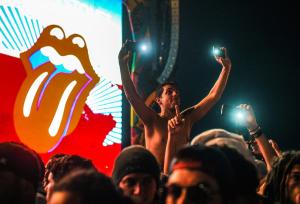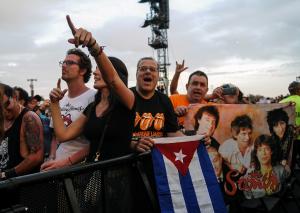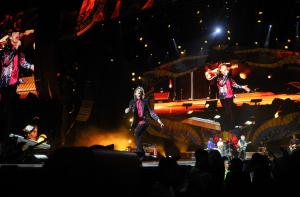Rolling Stones rock Cuba ready for 'change'
Havana (AFP) - Cubans had never seen the Rolling Stones before and after Mick Jagger rocked them in their hundreds of thousands in Havana, they and their communist island were unlikely ever to be quite the same again.
The massive crowd flowed across the Cuban capital's Ciudad Deportiva, a sports complex with a capacity of 450,000, the human tide spilling beyond into the streets. Fans even stood thick on neighboring rooftops to get a glimpse of history.
When fans raised their phones and cameras to get snapshots of Jagger strutting across the giant stage, the flashes looked like a new galaxy.
Kicking off Friday with "Jumpin' Jack Flash," as the sun set over Havana, this was the British superstars' first concert in Cuba.
But it was more: it was the first gig by any rock band that big, with a production featuring giant video screens and a sound system that got the crowd jumping, arms swaying, to classic after classic, from "Angie" to "Paint It Black."
And, because this was happening on an island seemingly frozen in time -- yet bursting with desire for change -- this was not only rock 'n roll.
View gallery

A crowd of hundreds of thousands flowed across the Cuban capital's Ciudad Deportiva, a huge spor …
Friday's free concert turned history on its head, in a country where just a few decades ago all rock music was considered part of an enemy plot against the communist state.
"We know that years ago it was difficult to hear our music in Cuba, but here we are playing," Jagger said in Spanish, prompting huge cheers.
"I think that finally the times are changing. That's true, isn't it?"
The crowd erupted during songs like "Out of Control" and "Satisfaction," with people of all ages singing along to the choruses and hopping up and down in rhythm to thunderous guitar solos.
"It's so amazing that they came to Cuba and united such a variety of people, young and old," said Andres Enda, 24, a dancer.
View gallery

Some fans had slept out overnight to get the best positions, while many others began streaming in mo …
"Change is already coming -- the fact they're here shows that."
- Winning Cuba over -
Aging rockers Jagger, Keith Richards, Charlie Watts and Ronnie Wood flew in late Thursday, just two days after US President Barack Obama ended his landmark visit aimed at overcoming more than a half-century of US-Cuban hostility.
The twin events added up to a tumultuous week for Cuba, run by Fidel Castro and now his brother Raul ever since their guerrilla army deposed a hated, US-backed regime in 1959.
Although Jagger's comment about changing times was his only overtly political statement, the whole concert seemed like a massive declaration by Cubans that they want to join the world.
View gallery

Rolling Stones frontman Mick Jagger, wearing a colorful sequined jacket over a burgundy shirt, kicke …
Between the 1960s and 1990s, rock 'n roll was discouraged to varying degrees in Cuba, leading during the most repressive years to clandestine listening sessions and an underground trade in smuggled recordings.
Those restrictions have gone, but the ban on political and media freedoms has not, while the ramshackle communist economy and decades-old US economic embargo have forced many into lives of stiflingly few opportunities.
The crowd danced, swayed and for one long spell joined Jagger, 72, in intense back-and-forth singing, seemingly sending a message that the time has come to move on.
"Mick Jagger showed his optimism here," said Sofia Fernandez de Cossio, 19. "There's a lot of optimism now. You notice it in the country. People are more positive."
Cuba's state news blog www.cubadebate.cu made the concert its top story Saturday, but didn't mention the call for change, instead focusing on Jagger's charm and how he told the crowd they were "cool."
الاشتراك في:
التعليقات (Atom)
